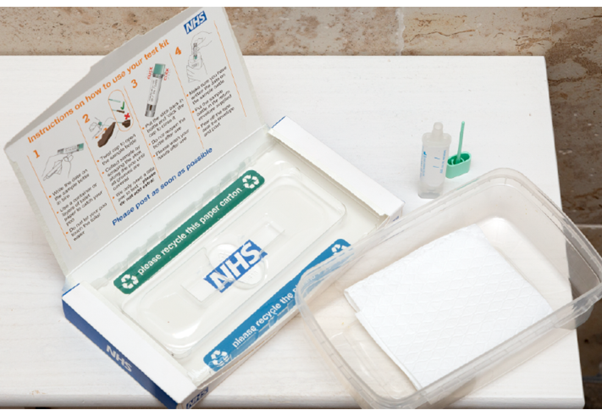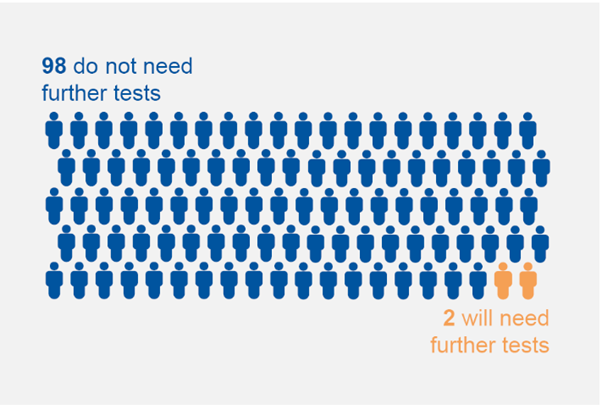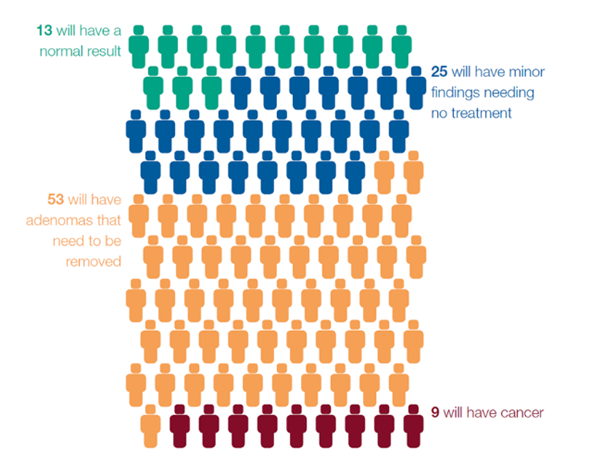NHS Bowel Cancer Screening checks if you could have bowel cancer. It’s available to everyone aged 56 to 74 years.
Everyone in the age range who is registered with a GP and lives in England is automatically sent an NHS Bowel Cancer Screening kit every 2 years.
The home test kit is called a faecal immunochemical test (FIT). You have to collect a small sample of poo and send it to a lab. This is checked for tiny amounts of blood.

Blood can be a sign of polyps or bowel cancer. Bowel cancer is also known as colon, rectal or colorectal cancer. Sometimes the cells that make up the bowel grow too quickly and form a clump of cells known as a bowel polyp. Polyps can sometimes change into a cancer over a number of years.
If the test finds anything unusual, you might be asked to go to hospital to have further tests to confirm or rule out cancer
Make sure your GP practice has your correct address so your kit is posted to the right place.
If you’re 75 or over, you can ask for a kit every 2 years by phoning the free bowel cancer screening helpline on 0800 707 60 60.
Humber and Yorkshire Service
The Humber and Yorkshire Bowel Cancer Screening Center covers three NHS Trusts: Hull University Teaching Hospital Trust (HUTH), North Lincolnshire and Goole NHS Foundation Trust (NLAG) and York Teaching Hospitals Foundation Trust (YTHFT).
The screening centre employs a core team of Management, Specialist Screening Practitioners (SSP) and Administration staff.
We have offices at Castle Hill Hospital and Diana Princess of Wales Hospital.
If the home test kits shows blood in your poo, you do not necessarily have bowel cancer (the blood could be the result of something like piles) but you will be invited to an assessment clinic with one of our SSP’s. These are either over the telephone or on the virtual platform ‘Attend Anywhere’. A leaflet will come with the appointment letter with instructions on how to join attend anywhere.
The SSP will talk with you about your screening result and answer any questions you have. They will discuss colonoscopy with you, and check if you are fit enough for the procedure.
Only around 2 in 100 people who complete the FIT kit need a colonoscopy.

Colonoscopy looks for polyps and bowel cancers. Colonoscopy looks at the lining of your large bowel. A colonoscopy specialist (usually a doctor or nurse) passes a thin flexible tube with a tiny camera attached (a colonoscope) into your back passage (rectum). They guide the colonoscope around your large bowel. If they find any polyps, they can usually remove them painlessly using a wire loop passed down the colonoscopy tube. They will check any removed polyps for cancer cells.
Colonoscopy is the best way to diagnose bowel cancer
If you are fit for colonoscopy and want to go ahead with the examination, we will arrange an appointment for you. If we do not think you are fit enough for colonoscopy, we may offer you a different investigation such as a computerised tomography (CT) scan (sometimes called a ‘virtual colonoscopy’).
Colonscopies are offered at Scunthorpe General Hospital, Diana Princess of Wales Hospital, Castle Hill Hospital, Hull Royal Infirmary and Scarborough Hospital. We will offer you the next available date for colonoscopy, this could be at any site, but you can chose to go to your local hospital if you prefer, although this may mean you are waiting longer for your investigations.
About 9 in 100 people have bowel cancer. If we find cancer, we will inform you of what the next steps are, advise you of your results and refer you to a cancer specialist, who will discuss treatment options with you.
If we find bowel cancer at its earliest stage, 9 out of 10 people (90%) have successful treatment. However not all bowel cancers found at screening can be treated successfully.

Results for every 100 people having colonoscopy after an abnormal FIT kit result
Bowel cancer symptoms
It is still possible to get bowel cancer even if you had:
- no polyps found at colonoscopy
- small polyps we did not need to remove
- small polyps we removed
It is important to be aware of bowel cancer symptoms. These include:
- blood in your poo (faeces)
- looser poo, pooing more often and/or constipation
- a pain or lump in your abdomen (tummy)
- feeling more tired than usual for some time
- losing weight for no obvious reason
Please remember that these symptoms don’t necessarily mean that you have bowel cancer. But if you have any of these symptoms for 3 weeks or more, please speak with your GP. It is important to do this even if you:
- did not need further tests after using the FIT kit
- did not need any treatment during or following colonoscopy
If you’re worried about a family history of bowel cancer or have any symptoms, speak to a GP for advice.
Reduce your risk of bowel cancer
Having bowel cancer screening reduces your risk of dying from bowel cancer by at least 25%.
You can also reduce your risk of bowel cancer by:
- keeping physically active
- keeping a healthy weight
- eating plenty of fibre, for example, choose wholegrain and wholemeal foods
- eating plenty of vegetables and fruit
- eating less red meat and especially less processed meat
- drinking less alcohol
- not smoking
For more information
- https://www.nhs.uk/conditions/bowel-cancer-screening/
- Hub telephone number to request a kit: 0800 707 60 60
- https://www.bowelcanceruk.org.uk/